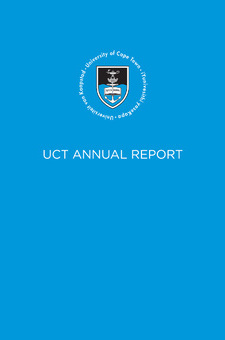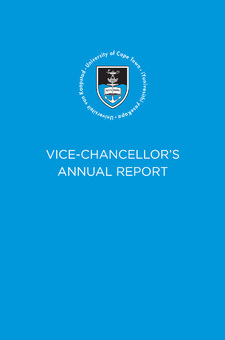Social Responsiveness
21 September 2020 Read time 10 min.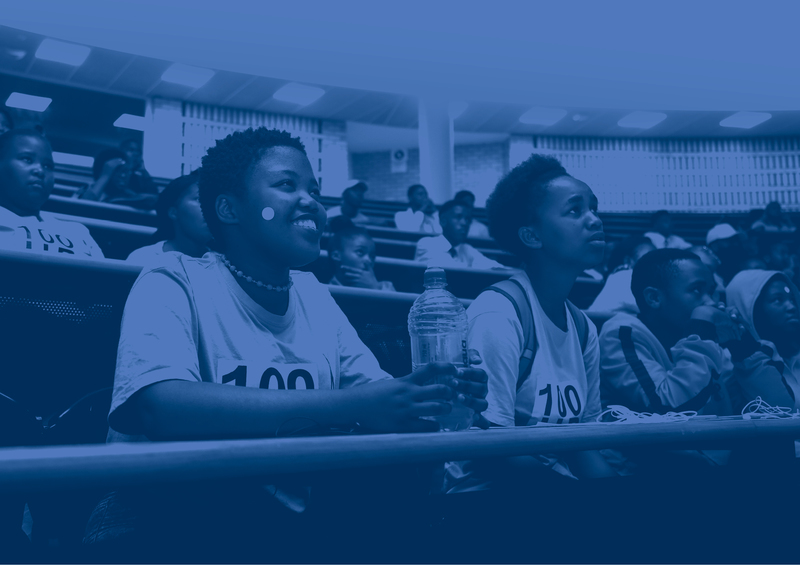
Social responsiveness at UCT is about taking the university into the community and bringing the community onto our campuses. Whether it’s organising social outreach programmes, providing opportunities for learning or enhancing research activities, these engagements build relationships that root the institution in the community, the country and the continent, positioning it at the forefront of social change. Our intention is to develop social interventions that address the complex challenges facing our society and deliver real, positive change. To this end, we encourage all our students and staff members to play an active development role in our cultural, economic, political, scientific and social environments.
Pioneering ‘new science’ in Masi
UCT’s Desmond Tutu HIV Foundation launched the new Aerobiology TB Research Facility at its Masiphumelele research site on 20 February 2019. The facility will focus on the study of the transmission of TB organisms and finding ways to halt the spread of the disease.
At the launch, Emeritus Professor Robin Wood, chief executive officer of the foundation, said poor socio-economic conditions are one of the key drivers of TB transmission.
The new facility specialises in capturing the organisms in the air exhaled by patients and examining the data. This process will allow clinicians and scientists to study each individual organism to try and develop ways to control TB in communities like Masiphumelele.
Read the article. | Watch the video.
Eskom Expo for Young Scientists
Aspiring scientists pulled out all the stops at the Eskom Expo for Young Scientists hosted by UCT in August 2019. The expo showcased the ingenuity, brilliance and out-of-the-box project ideas pioneered by hundreds of science enthusiasts from 47 schools around the Mother City.
Projects were entered in categories ranging from chemistry and food science to astronomy and sustainable development, addressing some of the world’s most pressing challenges.
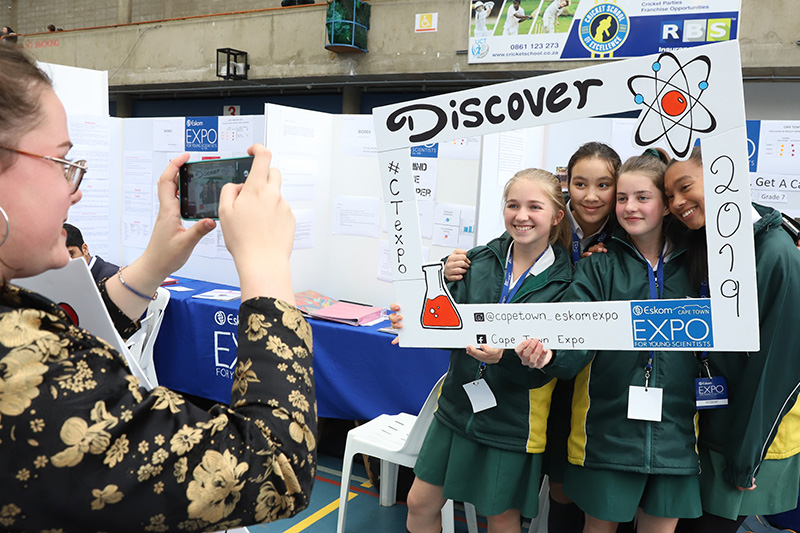
Training wannabe techies
#RoboCampCT, a one-week winter coding and robotics camp for high school learners, attracted 65 grade 10s and 11s, who were keen to boost their tech skills and prepare for more advanced coding courses.
The event was co-hosted by UCT’s School of Information Technology and software training institute CodeSpace. It provided learners with the environment, time and space to consider a future in coding. Learners were also schooled on design thinking, a methodology used to tackle complex, real-world problems.
Gamifying learning
On 14 September 366 grade 12 learners from 40 schools in the Western Cape gathered at Wynberg Girls’ High School to participate in the second mGenAfrica annual quiz competition.
The mGenAfrica platform, a joint initiative between UCT and the Western Cape Education Department, was launched to make learning life sciences – especially genetics – fun. The platform provides learners with the opportunity to test their knowledge, prepare for tests and exams, and to connect with UCT researchers during live chat sessions.
Inspiring the neuroscientists of tomorrow
“Our brains are the seat of our memory, of our past, our present and our future. They enable us to communicate with and understand the world, and live life as sentient beings.”
That was the message Dr Ursula Rohlwink, neuroscience fellow and lecturer at UCT’s Neuroscience Institute, shared with pupils from Capricorn Primary School during International Brain Awareness Week in March.
The 83 grade 7 learners from the Vrygrond school who visited UCT were treated to a jam-packed programme to learn everything about the brain. The day included an hour-long session on the brain, a demonstration of the brain’s electrical activity – conducted on a cockroach, and a visit to the university’s anatomy museum, where pupils could view real-life examples of the brain.
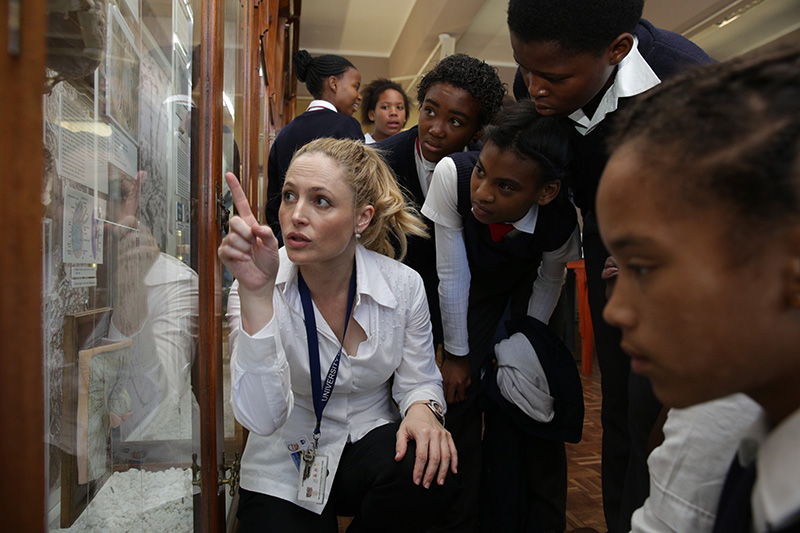
Read the article and watch the video.
Clinical research in Khayelitsha
Working on some of the most important breakthroughs in TB diagnostics globally, and testing HIV and TB vaccines, is a vital part of the pioneering work being done at the Wellcome Centre for Infectious Diseases Research in Africa (CIDRI-Africa).
Vice-Chancellor Professor Mamokgethi Phakeng launched an extension of the Khayelitsha-based clinical research site on 29 July 2019.
The UCT researchers, including 12 world-leading principal investigators, work hand in hand with the community, local and provincial departments of health and NGOs to find solutions to the high burden of TB and HIV in South Africa and across the globe.
Administered from UCT’s Institute of Infectious Disease and Molecular Medicine (IDM), the site operates at the Site B Khayelitsha Community Health Centre.
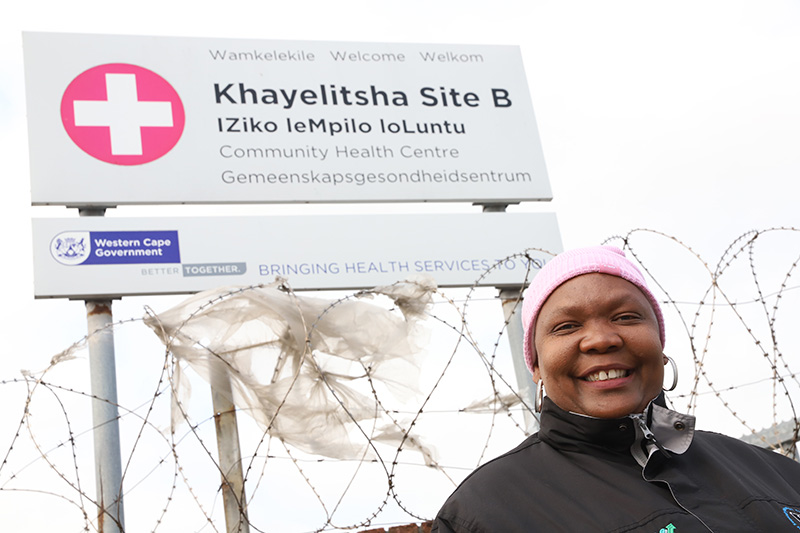
Read the article and watch the video.
Social responsiveness in numbers
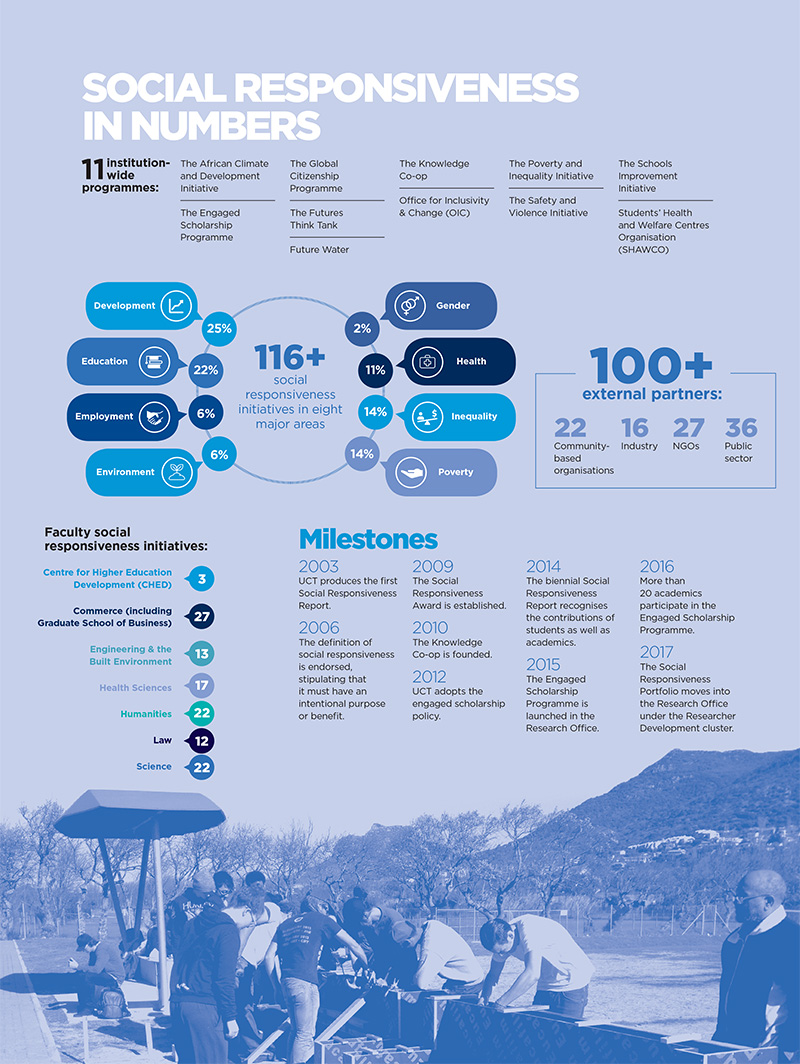
11 institution-wide programmes:
The African Climate and Development Initiative
The Engaged Scholarship Programme
The Global Citizenship Programme
The Futures Think Tank
Future Water
The Knowledge Co-op
Office for Inclusivity & Change (OIC)
The Poverty and Inequality Initiative
The Safety and Violence Initiative
The Schools Improvement Initiative
Students’ Health and Welfare Centres Organisation (SHAWCO)
116+ social responsiveness initiatives in eight major areas:
Development 25%
Education 22%
Employment 6%
Environment 6%
Gender 2%
Health 11%
Inequality 14%
Poverty 14%
100+ external partners:
22 Community-based organisations
16 Industry
27 NGOs
36 Public sector
Faculty social responsiveness initiatives:
Centre for Higher Education Development (CHED) 3
Commerce (including Graduate School of Business) 27
Engineering & the Built Environment 13
Health Sciences 17
Humanities 22
Law 12
Science 22
Milestones
2003 UCT produces the first Social Responsiveness Report.
2006 The definition of social responsiveness is endorsed, stipulating that it must have an intentional purpose or benefit.
2009 The Social Responsiveness Award is established.
2010 The Knowledge Co-op is founded.
2012 UCT adopts the engaged scholarship policy.
2014 The biennial Social Responsiveness Report recognises the contributions of students as well as academics.
2015 The Engaged Scholarship Programme is launched in the Research Office.
2016 More than 20 academics participate in the Engaged Scholarship Programme.
2017 The Social Responsiveness Portfolio moves into the Research Office under the Researcher Development cluster.
Student designs reimagine District Six
In 1966 apartheid laws banished more than 60 000 residents from their homes in District Six, signalling the official start of racial segregation in the Mother City. Decades later, honours students from UCT’s School of Architecture, Planning and Geomatics explored ways of developing new and alternative forms of housing for the area, while accommodating the ongoing restitution process and the residents’ ultimate return to the neighbourhood.
They did so as part of the Cape Town Spatial Justice Laboratory: Writing/Righting the City Otherwise project.
“The manifesto workshop was a real interactive, cross-sharing theatre of learning. The community was part of the performance; they offered their opinions and shared their ideas.”
– Iain Low, professor of architecture
Scrub Run raises over R200 000
Organised by UCT’s Surgical Society, the 10-kilometre peace run in aid of the Weekend Waiting List Initiative at the Red Cross War Memorial Children’s Hospital raised more than R200 000. The funds went to the Weekend Waiting List Initiative, which works to eradicate the backlog of children waiting for operations at the Red Cross Children’s Hospital.
Student Entrepreneurship Week
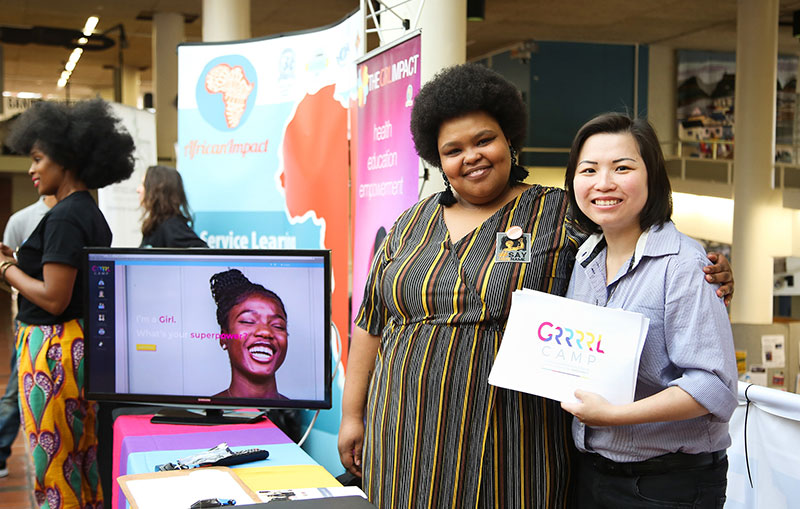
It was all things entrepreneurship at Student Entrepreneurship Week, hosted by UCT’s Careers Service from 16 to 20 September. Social impact organisations such as Dream Factory, The Underdog Project, Nal’ibali and UCT’s Knowledge Co-op were on hand to convince students that social entrepreneurship is a worthy and rewarding path to follow.
Read the article and watch the video.
Bumper Summer School
UCT extended its annual Summer School programme to three weeks in 2019, with lectures focusing on Africa and “issues of consequence”. Presenters included former public protector Professor Thuli Madonsela former acting commissioner of the South African Revenue Services Ivan Pillay and columnist Max du Preez.
10 years of NBTs
The National Benchmark Tests (NBTs) celebrated 10 years of assessing the academic readiness of prospective first-year students. UCT’s Centre for Educational Testing for Access and Placement (CETAP) in the Centre for Higher Education Development (CHED) administers the NBTs for the entire country.
A taste of university life
One hundred matric pupils from various Khayelitsha schools got a taste of university life when they took part in UCT’s extended annual Summer School programme. The learners were participants of the university’s 100UP programme, an initiative introduced in 2011 to address the low number of learners from disadvantaged communities entering UCT. The programme includes academic booster classes on campus every Saturday and intensive preparation sessions in the lead-up to exams.
Cool donation for student feeding programme
The UCT Food Programme received a major boost when the Strategic Fuel Fund donated a double-door fridge, secured by Dr Chance Chagunda from the Department of Social Development. The programme, which started in 2018, provided 600 lunches daily to students in need. These were made up, packed and distributed by staff and student volunteers, as well as members of local communities.
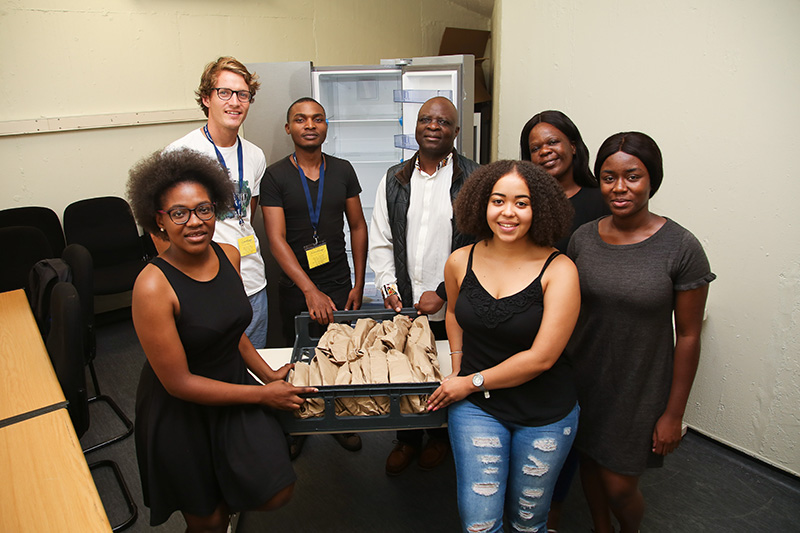
Read the article and watch the video.
 This work is licensed under a Creative Commons Attribution-NoDerivatives 4.0 International License.
This work is licensed under a Creative Commons Attribution-NoDerivatives 4.0 International License.
Please view the republishing articles page for more information.

Cover image: Spurred on by the death of UCT student Uyinene “Nene” Mrwetyana, UCT staff and students coalesced on Parliament in protest of increasing sexual and gender-based violence in the country.
Year in Review 2019

Graça Machel, Chancellor from 1999 to 2019, writes a message of welcome.
21 Sep 2020 - 2 min read
Q&A with Professor Loretta Feris, Deputy Vice-Chancellor: Transformation
21 Sep 2020 - >10 min read
Q&A with Associate Professor Lis Lange, Deputy Vice-Chancellor: Teaching and Learning
21 Sep 2020 - >10 min read
Previous Editions
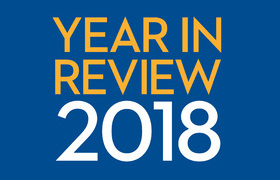
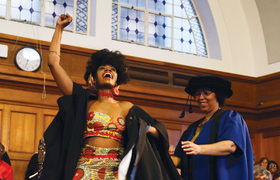
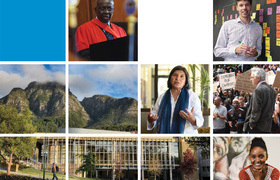
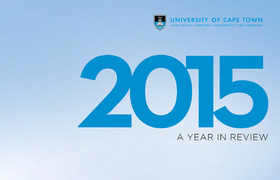
The Newsroom and Publications unit releases an annual report, which is a review of activities on campus during the previous year. It spans nearly all aspects of UCT life; and includes reports from senior executives on issues such as governance, teaching and learning, research, social responsiveness, transformation and employment equity. Each year the report illustrates clearly why UCT is held in such high regard in South Africa, Africa and across the globe.




















